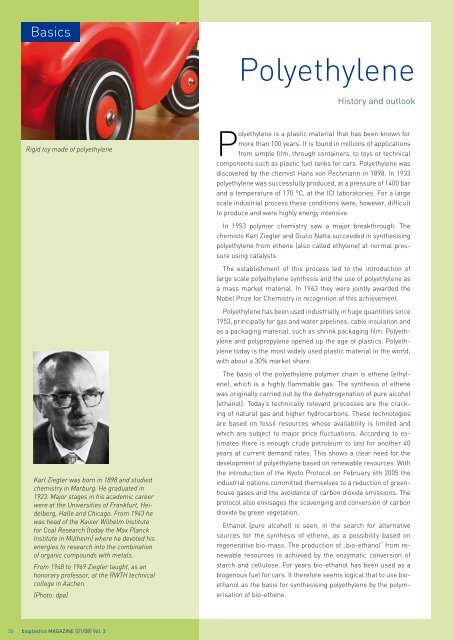01 | 2008
You also want an ePaper? Increase the reach of your titles
YUMPU automatically turns print PDFs into web optimized ePapers that Google loves.
Basics<br />
Polyethylene<br />
History and outlook<br />
Rigid toy made of polyethylene<br />
Polyethylene is a plastic material that has been known for<br />
more than 100 years. It is found in millions of applications<br />
from simple film, through containers, to toys or technical<br />
components such as plastic fuel tanks for cars. Polyethylene was<br />
discovered by the chemist Hans von Pechmann in 1898. In 1933<br />
polyethylene was successfully produced, at a pressure of 1400 bar<br />
and a temperature of 170 °C, at the ICI laboratories. For a large<br />
scale industrial process these conditions were, however, difficult<br />
to produce and were highly energy intensive.<br />
In 1953 polymer chemistry saw a major breakthrough. The<br />
chemists Karl Ziegler and Giulio Natta succeeded in synthesising<br />
polyethylene from ethene (also called ethylene) at normal pressure<br />
using catalysts.<br />
The establishment of this process led to the introduction of<br />
large scale polyethylene synthesis and the use of polyethylene as<br />
a mass market material. In 1963 they were jointly awarded the<br />
Nobel Prize for Chemistry in recognition of this achievement.<br />
Polyethylene has been used industrially in huge quantities since<br />
1953, principally for gas and water pipelines, cable insulation and<br />
as a packaging material, such as shrink packaging film. Polyethylene<br />
and polypropylene opened up the age of plastics. Polyethylene<br />
today is the most widely used plastic material in the world,<br />
with about a 30% market share.<br />
Karl Ziegler was born in 1898 and studied<br />
chemistry in Marburg. He graduated in<br />
1923. Major stages in his academic career<br />
were at the Universities of Frankfurt, Heidelberg,<br />
Halle and Chicago. From 1943 he<br />
was head of the Kaiser Wilhelm Institute<br />
for Coal Research (today the Max Planck<br />
Institute in Mülheim) where he devoted his<br />
energies to research into the combination<br />
of organic compounds with metals.<br />
From 1948 to 1969 Ziegler taught, as an<br />
honorary professor, at the RWTH technical<br />
college in Aachen.<br />
(Photo: dpa)<br />
The basis of the polyethylene polymer chain is ethene (ethylene),<br />
which is a highly flammable gas. The synthesis of ethene<br />
was originally carried out by the dehydrogenation of pure alcohol<br />
(ethanol). Today‘s technically relevant processes are the cracking<br />
of natural gas and higher hydrocarbons. These technologies<br />
are based on fossil resources whose availability is limited and<br />
which are subject to major price fluctuations. According to estimates<br />
there is enough crude petroleum to last for another 40<br />
years at current demand rates. This shows a clear need for the<br />
development of polyethylene based on renewable resources. With<br />
the introduction of the Kyoto Protocol on February 6th 2005 the<br />
industrial nations committed themselves to a reduction of greenhouse<br />
gases and the avoidance of carbon dioxide emissions. The<br />
protocol also envisages the scavenging and conversion of carbon<br />
dioxide by green vegetation.<br />
Ethanol (pure alcohol) is seen, in the search for alternative<br />
sources for the synthesis of ethene, as a possibility based on<br />
regenerative bio-mass. The production of „bio-ethanol“ from renewable<br />
resources is achieved by the enzymatic conversion of<br />
starch and cellulose. For years bio-ethanol has been used as a<br />
biogenous fuel for cars. It therefore seems logical that to use bioethanol<br />
as the basis for synthesising polyethylene by the polymerisation<br />
of bio-ethene.<br />
26 bioplastics MAGAZINE [<strong>01</strong>/08] Vol. 3


















